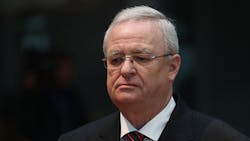Fraud?! German Prosecutors Probing Former VW CEO
FRANKFURT AM MAIN, Germany — German prosecutors said Friday they were investigating Volkswagen’s former CEO Martin Winterkorn on suspicion of fraud over the “dieselgate” emissions cheating scandal, dealing a blow to the auto giant’s attempts to move on from the crisis.
Investigators say they have “sufficient indications” that Winterkorn may have known earlier than he has so far admitted about the cheating, adding his and 15 other names to a growing list of people facing probes for fraud and false advertising. Winterkorn is already under investigation for suspected market manipulation related to the scandal.
The new evidence comes from the “questioning of witnesses and suspects and the examination of confiscated computer files,” the prosecutor’s office in the north German city of Brunswick said in a statement.
With the 16 names added Friday, there are now a total of 37 people under investigation. Prosecutors added that they had this week searched 28 homes and offices linked to the new names on the list.
Volkswagen admitted in September 2015 to installing so-called “defeat devices” in 11 million vehicles worldwide, after their existence was revealed by the US Environmental Protection Agency. The software caused engines to reduce emissions of harmful nitrogen oxide when they were undergoing regulators’ tests.
Winterkorn — known inside VW as “Mr. Quality” for his perfectionism — stepped down the same month, but has always denied any knowledge of the cheating before it became public.
U.S. investigators and German media have alleged that VW executives knew of the scandal as far back as July 2015, but decided to say nothing. “That is not the case,” Winterkorn told German lawmakers at a parliamentary hearing into the dieselgate affair earlier this month.
VW agreed this month to plead guilty to fraud in the United States and pay fines amounting to $4.3 billion to close its emissions cases with the Department of Justice. The payment, which will allow VW to avoid a trial, comes on top of $17.5 billion in fines and compensation already agreed to cover the costs of the scandal in the U.S.
But if it is proved that Winterkorn knew about the cheating earlier and colluded in covering it up, VW’s legal bills could skyrocket, according to auto industry expert Ferdinand Dudenhoeffer of Germany’s CAR institute: “Winterkorn would become very expensive for VW,” he told AFP.
In Germany alone, investors have filed claims seeking some 8.2 billion euros ($8.79 billion) in damages, saying the carmaker failed to inform them quickly enough about the cheating scandal before its shares plunged in September 2015.
Along with Winterkorn, investigators are looking into former finance director Hans Dieter Poetsch — now supervisory board chairman — and VW brand chief Herbert Diess on suspicion of holding back information from investors.
Much of the scandal relates to “the old system at VW” under Winterkorn, Dudenhoeffer said. Under CEO Matthias Mueller, installed after Winterkorn’s departure, “the new VW we’re seeing looks different,” he added.
As part of its efforts to turn the page on the crisis, the firm has announced a massive restructuring, with plans to shed 30,000 jobs and invest in a slew of new electric models in coming years.
But in a sign that “dieselgate” continues to make waves at the carmaker, compliance chief Christine Hohmann-Dennhardt, a former judge, stepped down this week — just a year after she was brought to help clean up VW’s image. VW said it would nevertheless “press forward with changes to its way of thinking and working” in the wake of her departure.
Hohmann-Dennhardt’s leaving was “a bad sign” that “the cultural change is a battle that’s continuing,” Dudenhoeffer said. “She stood for the new direction at VW.”
Volkswagen shares fell by 0.79% to 151.30 euros ($162.10) in afternoon trading in Frankfurt, underperforming the DAX index of leading German firms which was down 0.19%.
By Tom Barfield
About the Author
Agence France-Presse
Copyright Agence France-Presse, 2002-2025. AFP text, photos, graphics and logos shall not be reproduced, published, broadcast, rewritten for broadcast or publication or redistributed directly or indirectly in any medium. AFP shall not be held liable for any delays, inaccuracies, errors or omissions in any AFP content, or for any actions taken in consequence.
